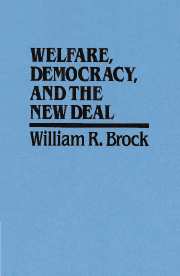6 - To aid the states
Published online by Cambridge University Press: 07 December 2009
Summary
Despite all the pressure that the FERA could exert, the bottom line was that it existed to give grants to the states. Once a state had received a grant, it controlled expenditure; state law defined the authority of relief agencies, executive orders were issued by the governor or by the relief director he had appointed; the legislature decided what money should be appropriated from state resources. Members of a state relief administration and county directors might tacitly acknowledge the FERA as their real superior; but they were servants of the state, derived their authority from its law, were bound to observe the authority of the governor, and might find their operations curtailed if the legislature failed to make an adequate appropriation.
This situation made the relationship between the FERA and state authorities uneasy and possibly hostile. Field representatives had to spend a great deal of time conciliating governors, finding ways of circumventing those who were unsympathetic or obstructive, or working out the best way of backing those who were cooperative but who faced opposition. State relief directors were usually ready to follow the FERA guidelines, but if disputes arose they were fully entitled, as state officials, to resist federal directives. County commissions and township boards might have failed in the task of providing adequate relief, but they retained powers derived from state laws or constitutions. Most frustrating of all, for the FERA and its local allies, was inaction or obstructive action by majorities in the state legislatures.
- Type
- Chapter
- Information
- Welfare, Democracy and the New Deal , pp. 204 - 249Publisher: Cambridge University PressPrint publication year: 1988



